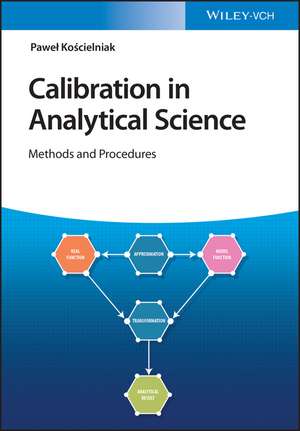Calibration in Analytical Science – Methods and Procedures
Autor P Koscielniaken Limba Engleză Hardback – 21 mar 2023
Preț: 776.92 lei
Preț vechi: 1008.99 lei
-23% Nou
Puncte Express: 1165
Preț estimativ în valută:
148.67€ • 156.33$ • 122.84£
148.67€ • 156.33$ • 122.84£
Carte disponibilă
Livrare economică 24-29 martie
Livrare express 12-18 martie pentru 66.70 lei
Preluare comenzi: 021 569.72.76
Specificații
ISBN-13: 9783527348466
ISBN-10: 3527348468
Pagini: 384
Dimensiuni: 181 x 257 x 24 mm
Greutate: 0.88 kg
Editura: Wiley Vch
Locul publicării:Weinheim, Germany
ISBN-10: 3527348468
Pagini: 384
Dimensiuni: 181 x 257 x 24 mm
Greutate: 0.88 kg
Editura: Wiley Vch
Locul publicării:Weinheim, Germany
Notă biografică
Pawel Koscielniak received his Ph.D. in Chemistry in 1981 from the Jagiellonian University in Krakow, where he is now a full professor (since 2000) and heads the Department of Analytical Chemistry. He is a member of the Committee of Analytical Chemistry of the Polish Academy of Sciences. Prof. Koscielniak is the author, co-author and editor of more than 300 scientific articles, books and book chapters. The main areas of his scientific interest are flow analysis, forensic chemistry and environmental analysis with special attention paid to such issues as analytical calibration, examination and elimination of interference effects, optimization and validation of analytical procedures.
Cuprins
Introduction PART I: Calibration in qualitative analysis Calibrationless analysis Theoretical calibration Empirical calibration Classification and error analysis PART II: Calibration in quantitative analysis Calibrationless analysis Theoretical calibration Empirical calibration - Procedural classification - Methodological classification - Combined calibration methods - Recovery in the calibration context PART III: Calibration in semi-quantitative analysis PART IV: Calibration in multivariate analysis PART V: Calibration in the context of green analytical chemistry Conclusion
